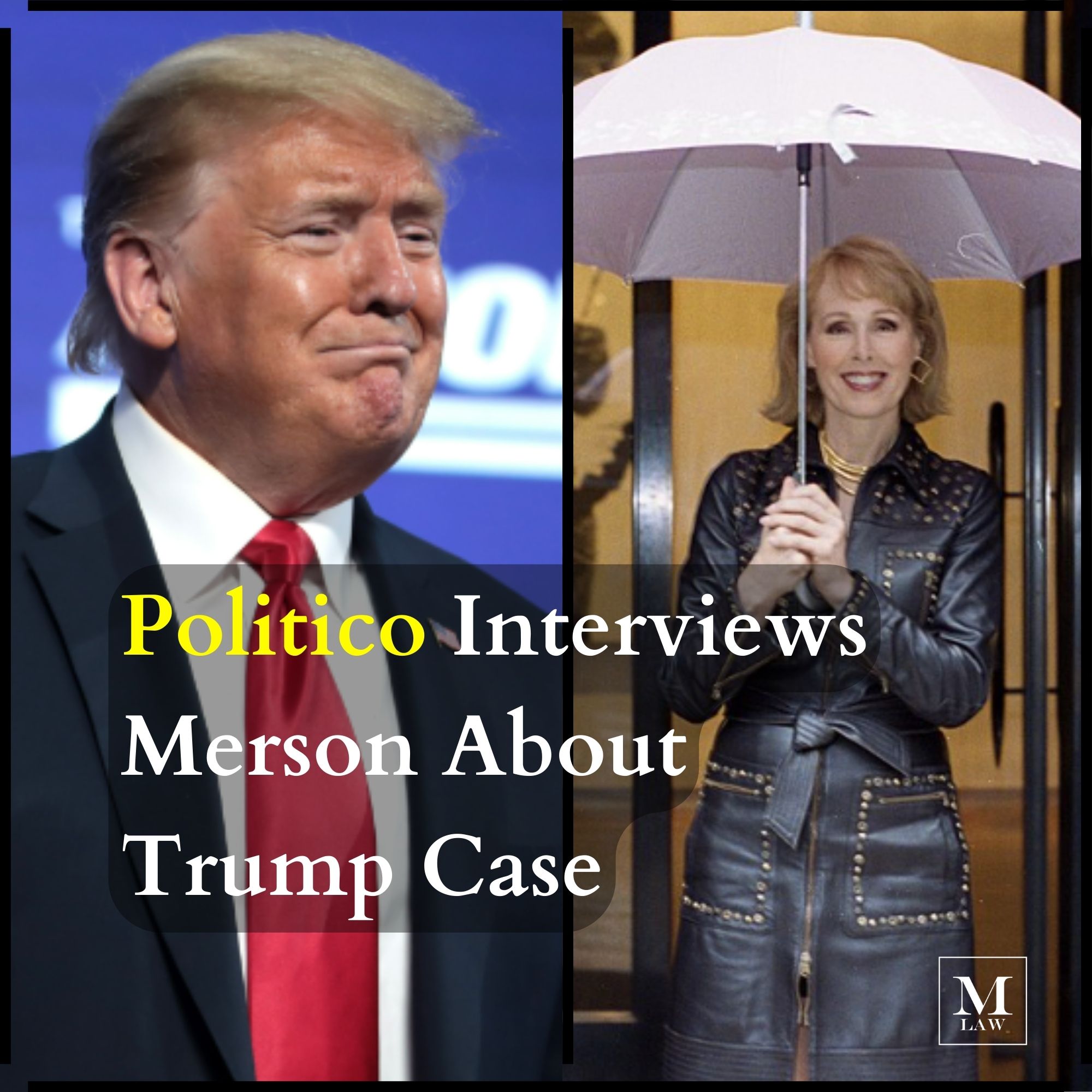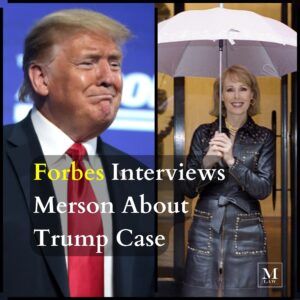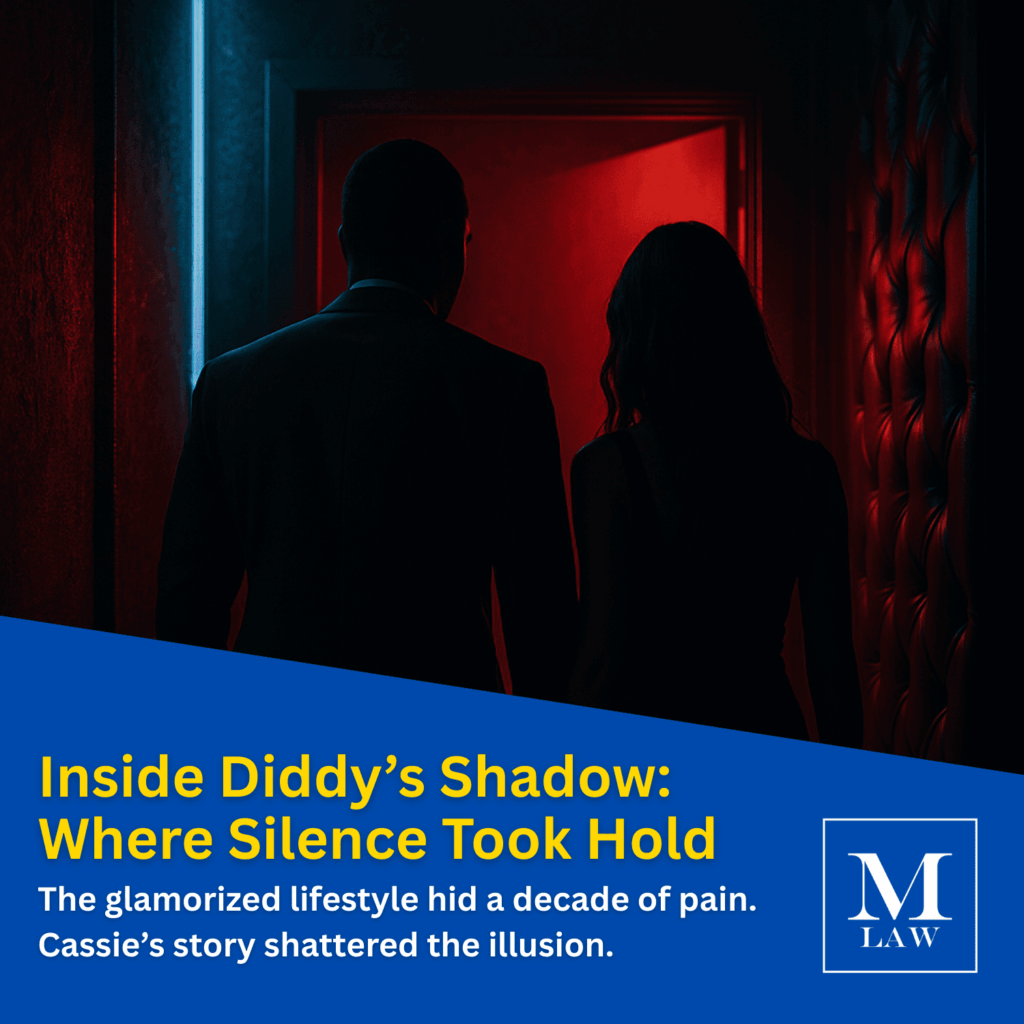“Juries tend to be very sympathetic to survivors of sexual abuse, especially if there’s any type of verbal disparagement thereafter. If the jury finds for Ms. Carroll, you could be looking at a very significant damages award. Many millions of dollars.”
Less that one month after being indicted on charges related to a hush money payment to a porn star, former President Donald Trump is about to stand trial in a civil lawsuit from a magazine columnist who says he raped her decades ago.
E. Jean Carroll, a longtime columnist for Elle magazine, says Trump attacked her in a dressing room of a luxury department store in the 1990s and sexually assaulted her — a claim Trump denies, saying the incident “never happened.” On Tuesday, jury selection is scheduled to begin in Manhattan federal court for the trial.
Though the case is civil and not criminal, meaning there is no threat of jail time for the former president, the stakes are nonetheless high. If Carroll wins, it would be the first time Trump has been held legally responsible for sexual assault, despite dozens of women who have accused him of that crime and other sexual misconduct. The jury could order Trump to pay Carroll a financial award that one legal expert said could be “many millions of dollars.” Carroll is seeking monetary damages but has not specified an amount.
And, of course, a civil verdict against Trump would add to his avalanche of legal troubles as he is seeking to regain the presidency while under indictment in an unrelated case and facing the possibility of additional criminal charges in several other investigations.
The trial is also risky for Carroll, who must convince a jury to believe her accusation against an incredibly high-profile defendant for an incident that allegedly occurred nearly 30 years ago and lacked any eyewitnesses.
According to Carroll, one night in either late 1995 or early 1996, she bumped into Trump while she was leaving Bergdorf Goodman. He recognized her, she said, because they had met once before and “had long traveled in the same New York City media circles.” Telling her that he was at the store to buy a present for “a girl,” Trump asked Carroll for her advice, and after the two discussed a few ideas, Trump suggested visiting the lingerie department, according to the lawsuit.
There, on the counter, they saw a lilac gray see-through bodysuit, and the two teased each other about which one of them should try it on, the lawsuit says. According to Carroll, Trump then “grabbed” her arm, “maneuvered” her to the dressing room and closed the door. There were no attendants or other shoppers nearby, Carroll said.
Once inside the dressing room, Trump pushed her up against the wall, bumping her head and “putting his mouth on her lips,” according to Carroll. After she pushed him back, she said, he “seized both of her arms,” pushed her again and then “jammed his hand under her coatdress and pulled down her tights.”
After unzipping his pants, “Trump then pushed his fingers around Carroll’s genitals and forced his penis inside of her,” according to the lawsuit.
After breaking free by raising up her knee and pushing him off, she said she ran out of Bergdorf’s and immediately called a friend, Lisa Birnbach, and told her about the incident. “He raped you,” Birnbach said, according to Carroll. Birnbach encouraged her to call the police, but “still in shock and reluctant to think of herself as a rape victim, Carroll did not want to speak to the police,” the lawsuit says.
Several days later, Carroll says she disclosed the events to another friend, Carol Martin. Martin advised Carroll to tell no one, advice she says she took.
Carroll’s attorneys have indicated they likely will call both Birnbach and Martin to testify. Both women backed up her account in media interviews shortly after Carroll went public with her claims in 2019.
Trump, for his part, denies the entire episode. He said in 2019 that he had “never met this person in my life” and that she was manufacturing stories about him for the purpose of selling a book in which she detailed the alleged assault. Last year, he repeated the denials on his social media site and again accused her of promoting a “hoax,” adding that, “while I am not supposed to say it, I will. This woman is not my type!”
In court filings, Trump’s attorneys have suggested that his defense may include questioning the plausibility of Carroll’s claim that there were no customers or staff around to witness the incident, drilling into the notion that she can’t pinpoint the date when the attack allegedly occurred and arguing that Carroll is politically and financially motivated.
Lawyers for Carroll and Trump declined to comment.
Carroll is suing him for sexual assault under the Adult Survivors Act, a 2022 New York law that gave a one-year window beginning in November of that year for people to sue their alleged assailants even if the statute of limitations had expired, which it had in Carroll’s case. In addition to the sexual-assault claim, Carroll is suing Trump in this week’s trial for defamation over his 2022 comments.
In a separate lawsuit, she is also suing him for defamation regarding his 2019 comments; the trial for that case is delayed pending a ruling on whether Trump can be sued personally for comments he made while he was president.
Civil lawsuits arising from sexual assaults are not uncommon. (Trump is not even the first president to be sued for sexual misconduct: Paula Jones famously sued Bill Clinton during his presidency for sexual harassment in a case that reached the Supreme Court.) But the Trump trial will require highly unusual measures. Perhaps most significantly, the judge presiding over the case, U.S. District Judge Lewis Kaplan, has ordered an anonymous jury — meaning the names of the jurors will not be disclosed to the public or to Carroll, Trump or their attorneys — due to “a very strong risk that jurors will fear harassment.”
In his order regarding the unusual step of protecting the juror’s identities, Kaplan, a Clinton appointee, cited a series of alleged threats of violence by Trump, his attacks on jurors in other cases, his encouragement of the Jan. 6, 2021 riot at the U.S. Capitol and his statement urging his supporters to protest what he predicted would be his arrest in connection with the district attorney’s investigation.
In another twist, Trump has indicated that he probably won’t attend the trial. In a court filing, his lawyers cited the “logistical burdens” of him appearing in court due to his Secret Service protection, a wrinkle the judge rejected as an adequate reason for failing to appear, while noting that he has no legal obligation to either attend or testify.
In other ways, however, the case is typical of sexual assault lawsuits. Such cases are commonly brought many years after the incident in question, because victims often take a long time to come to terms with what has happened to them, and often center on a situation witnessed by no one but the plaintiff and the defendant, said Peter Saghir, a lawyer who represented Anthony Rapp in his battery trial against Kevin Spacey, whom Rapp accused of making a “sexual advance” on him in 1986. (A jury found Spacey not liable for battery.)
“These cases are so difficult because these events are almost always unwitnessed,” Saghir said. “I’m sure Trump is going to be arguing, clearly if I raped someone, why wasn’t she screaming? Why wasn’t she yelling? There’s no video. It doesn’t mean that it didn’t happen. It’s usually one person’s word against the other word.”
In Carroll’s case, he noted, she does have corroboration from the two friends she says she told contemporaneously.
Carroll’s case is also likely to hinge on her own testimony and whether a jury believes her story, said Jordan Merson, a lawyer who represents five women suing Bill Cosby for sexual abuse. “It seems like Trump’s legal team is going after her credibility, so her cross examination when she’s on the witness stand is going to be a very important part of the case.”
Merson noted that cross examination for a sexual assault victim can be “very difficult” because the plaintiff is being challenged on something they typically find painful to talk about under even the most inviting circumstances.
If the jury does believe Carroll’s story about the alleged rape, Merson said the defamation claim may significantly boost any monetary award she is given. Carroll is seeking unspecified damages — and for Trump to retract the statement he made about her on his social media site.
“Juries tend to be very sympathetic to survivors of sexual abuse, especially if there’s any type of verbal disparagement thereafter,” Merson said. “If the jury finds for Ms. Carroll, you could be looking at a very significant damages award,” he said. “Many millions of dollars.”
Original article written by Erica Orden and published in Politico








